- Home
- Niall Teasdale
Gunwitch: Rebirth
Gunwitch: Rebirth Read online
Gunwitch: Rebirth
A Gunwitch Novel
By Niall Teasdale
Copyright 2016 Niall Teasdale
Amazon Kindle Edition
Contents
Foreword
Part One: Utopia
Part Two: Rotten Apple
Part Three: Dead Tomorrow
Part Four: Damnation
Epilogue
Foreword
Manchester, UK, December 2016.
Long, long ago, long enough that it really does seem like a galaxy far, far away, there was an online multiplayer game called City of Heroes. It was the best MMO ever made! Okay, so I may be exaggerating a little. Like every game, it had its problems, but out of all the online games I’ve played, CoH was the one I would keep coming back to and that was down to one thing: the role-playing community.
One of the European servers, Union, quickly developed a nightly, public RP forum. Each evening, people would meet at the foot of a huge statue, the Galaxy Girl statue, in the Galaxy City area and just pretend that they really were superheroes (or their alter egos) gathering to provide support for each other in a city full of crime. People created plots around their characters and others interacted in those plots. To support the role play, people would post material on the game’s forums, including stories about their characters. A lot of good writing came out of that group. At least two published authors emerged from it, that I know of.
I have used elements of several of my characters from the Galaxy Girl meets in my books. Twilight from the Ultrahumans series is heavily based on Nitoichi from CoH, including her boyfriend, Jacob. Aneka borrows from stories I wrote about a future version of Nitoichi, and Anastasia the pirate queen from the Aneka stories was a direct lift of another character.
However, Nitoichi had a ‘sister’ who was developed when the Going Rogue supplement came out, Gunwitch. I’ve used tiny bits of Gunwitch in other characters, but I was recently reminded of her and I thought it would be interesting to give her a makeover. She was always one of my favourites, her and Nitoichi. The original character was very much a child of the world she was created for. I can’t use her exactly as she was, but I’ve taken the essential elements and transposed her over into a new world where I can tell her story to a broader audience. Hopefully, new readers will find her as interesting as I always did back in the day.
I don’t normally do dedications, and no change here, but for once I’m going to acknowledge a few people without whom this book wouldn’t exist. The Galaxy Girl Roleplayers, all of them, helped to shape Gunwitch in numerous ways. The creators, programmers, and community support team for City of Heroes obviously helped: there would be no Gunwitch without them. More, without all those people, I probably wouldn’t be writing books for a living. Thank you, all of you.
Now, on with the story…
Part One: Utopia
Utopia City, North-West Enclave, 22/10/83.
A figure, tall, muscular, and dressed in a dark-blue boiler suit, appeared from behind a dumpster, the shotgun in his hands rising to take aim. An immediate threat, unarmoured, range two point one metres, direct fire required, expanding warhead recommended. Annette raised her right arm, barely seeming to aim, before she fired off two rounds which reduced the man’s face to bloody pulp.
As she took a step forward, a second man emerged further down the alley. His threat assessment was lower since his shotgun was less effective at four point five metres, but he was wearing body armour. At this range, Annette hardly lifted her left-hand pistol before firing. Each round began trailing a white mist as it flew, curling up from its low initial track to strike the gunman’s chest. High-density penetrators punched through the man’s vest and he fell backward.
Annette’s eyes scanned the environment as she continued down the alley. Thermographic imaging detected a humanoid heat signature behind a large cardboard box, and Annette put three rounds through it before moving on. A figure appeared in a window above her, and she put one of her bullets through his eye. As she stepped out of the alley and onto a more open street, a squad of four gunmen broke cover from behind some parked vehicles. Annette lifted her weapons and swung them in a wide arc in front of her. A hail of bullets streaming white smoke fanned out to take down the entire group.
As the last of them hit the tarmac, a horn sounded and the lights came up, and Utopia City at night became a set, part of the Utopia Defence Force’s urban combat training facility. Clapping sounded from Annette’s right as the blare of the horn died, and she turned to smile at her father and Captain Latham.
‘Did I not say this was something you had to see, James?’ Charles Barrington said, enthusiasm ringing in his voice. ‘Annette designed the entire system, had the installation done herself, and she’s even quite effective at demonstrating it. If I do say so myself, obviously.’
Latham laughed. ‘You’ve a right to play the proud father. The system seems to work exceptionally well, Annette. How easily can it be fitted to others?’
‘Well,’ Annette said, lifting one of her pistols, ‘the weapons themselves have some novel features which could be utilised in more or less any projectile weapon, but for the whole thing… The cybernetics need to be customised to the individual user, especially the nanotech components. It’s not something that can be used as standard issue. I was thinking of it as more like an addition to the packages you deploy to Special Actions Unit officers.’
‘Which is why I came to you, James,’ Charles said.
Latham nodded. ‘It looks like something we could use.’ His eyes scanned over Annette appreciatively. ‘Have you considered joining the SAU yourself, Annette?’
Charles was speaking before Annette could give her own answer. ‘Oh, Annette’s more of a backroom girl. Let’s head back to your office and talk deployment.’
Latham allowed himself to be led away and neither man noticed the frown on Annette’s face. She did not see herself as a ‘backroom girl.’ Her brother was out there fighting the good fight. Why should she be forced to stay out of it?
Turning and starting for the beginning of the course, Annette swept her arms to her back and the streamlined pod she was wearing. Robot limbs extended quickly, replacing the spent magazines with full ones.
‘Can we reset?’ she called out to the range technicians. ‘I’d like to go again.’ She was not entirely happy with target acquisition and she only had one more day to perfect things. The lights dimmed in the room and she turned, waiting for her first target.
24/10/83.
Annette slid her shades down her nose and watched her would-be suitor’s expression shift. The changes were subtle and complex, but she had software assistance in detecting and analysing them: mild revulsion, more surprise, and a sharp spike of fear. She always forgot to turn the analysis off when she went out for an evening, and she always regretted not doing so before the night was out.
‘Uh, sorry,’ the young man said. ‘I, uh, thought you were someone else.’
Annette had heard that one a lot in the last six months. Imagination was not a strong point in the minds of modern horny twenty-somethings. ‘That’s okay,’ she said and turned her head away.
In the mirrored surface at the back of the bar where she was sitting, her reflection looked back at her through eyes which were a uniform white across their entire surface. That was what had caused the sudden change of heart in the boy. Annette pushed her glasses back up to hide her eyes. There were no obvious outward signs that she was a cyborg, until someone saw her eyes. Cyborgs in general got the same reaction, but Annette had a suspicion that her particular implants made it a little worse. Someone had once told her that the eyes are the windows of the soul, in which case Annette figured she had lost both.
Exce
pt that that was wrong: she had lost nothing, she had traded them away, done it on purpose. Six months earlier, she had voluntarily gone into hospital and had the cybernetics fitted so that she could test out the combat system she had designed. And she had been so happy when the bandages came off…
12/4/83.
Annette sat up in bed, waiting patiently for… No, that was a lie. Her patience had long since dried up and it was a good thing that Doctor Camberwell would be along soon to remove the bandages, because if he had not been, she was getting to the point of ripping the things off herself.
Except that that was not entirely true either. She was confident of her design, confident of the job she had done manufacturing the components, but there was still an edge of nervousness tickling at her stomach. Something could have gone wrong and, if that was the case, she was going to be blind until the problem was fixed. Fixing it was going to be difficult if she could not see. The problem would almost certainly be in the nanotech she had used to do the nerve splices. She had modelled it, tested it on animal nerve tissue, done everything she could to be sure there would be no problems, but she might have overlooked something…
Further descent into disaster speculation was stopped by the opening of the door to her room and Camberwell’s voice. ‘Are we ready to see again, Miss Barrington?’ The fact that he was using her last name suggested that he was not alone: Annette thought they were past that, but probably not in front of…
‘I certainly hope so.’ Her father’s voice, carrying something of a menacing edge. Her father had always been a little overprotective. That edge probably explained the slightly forced joviality she had heard in the doctor’s voice.
‘A little impatient, to be honest,’ Annette said.
‘Then we won’t keep you waiting,’ Camberwell said. ‘Nurse, if you would…’ There was a slight pause and then Annette felt scissors being applied over her right temple. ‘Now remember,’ Camberwell went on, ‘like any cybernetic replacement, there is likely to be a period of adjustment.’
‘I know, Doctor,’ Annette replied. She did know. Just as she knew that the statement was more a reminder for her father.
‘Much of the image we see is constructed in the brain. It will take a short time for your brain to adjust to the new input.’
‘The research I did suggested five to six days to fully adjust to the normal spectrum vision. Up to a month for the full range of features.’
Camberwell forced out a chuckle. ‘I’m sure you’ve researched it thoroughly.’
‘A lot of research in the neurology of vision was done before the war,’ Annette explained as the thick bandages were wound off her face. ‘There were some particularly interesting studies using volunteers fitted with goggles that inverted the image coming into their eyes. Generally, they saw everything the right way up after five days of constant use.’
‘You won’t be able to see for another four days?’ Charles asked.
‘I’ll be able to see,’ Annette corrected, ‘but there might be some anomalies. Uh, I might get a little dizzy because the image I’m seeing doesn’t quite match what I expect to see. Or there might be some weird synchronisation problems with my other senses. It’s quite possible that I’ve changed the timing for visual signal transmission to my brain and that could throw a few things off. But brains are adaptable. Mine will work it out.’ The pressure around Annette’s head slackened entirely: the bandages were gone.
‘Quite so,’ Camberwell agreed. ‘Now, open your eyes.’
For long enough that Annette’s stomach was starting to sink, there was nothing. The darkness continued and she forced herself to wait, knowing that the processors in her new eyeballs would take a second or two to fire up for the first time.
‘Annette?’ Charles asked. There was concern in his voice this time, which was better than menace.
Pinpricks of light appeared, spreading until she was seeing a greyscale blur. Annette’s eyes narrowed as she tried to make out shapes in the snow.
‘Annette?’ Charles repeated, and the menace was back.
Colours appeared. Bright flares of blue, green, and red, blending at the edges and entirely not what Annette expected to see in the room. ‘Uh,’ Annette said. But the colours were still shifting, normalising. ‘I think…’ With a lurch, everything seemed to resolve into normality and Annette leaned back. ‘Woah!’ She grinned, looking around at the three people in the room. Turning her head made the image ripple and she giggled.
‘Annette?’ Charles said again, but his lips were starting to turn up at the corners.
‘I can see!’ Annette exclaimed. ‘I can see all of you, and the room.’ She lifted her hand, spreading her fingers and turning it over. Again, the motion caused some ripples at the edges, but that effect was already diminishing. ‘I can see my hand. The processors are still trying to fully integrate all the receptors, but I expected that.’ She looked at her father. ‘It’s working. So far anyway.’
‘That’s good,’ Charles said, and then frowned as Annette giggled again.
‘Sorry. I was right about the synchronisation thing. Your lips are moving just ahead of me hearing the words. Unless that’s normal and I’ve never noticed before.’
‘I should imagine not,’ Camberwell said. He smirked and nodded as Annette let out another giggle. ‘But that will be a temporary issue.’
‘And in the meantime,’ Annette said, ‘I’ll just have to learn not to giggle at everyone who talks to me. Uh, Poppa, why don’t you go grab a coffee or something. I’d just like a few minutes to get used to this and let the electronics settle.’ With a judder, a window opened in her visual field, a semi-transparent overlay with text scrolling through it: her implanted computer system was working through its boot sequence. ‘Yeah, just a few minutes.’
‘I… can do that,’ Charles said. His smile looked a little forced.
‘The nurse can keep an eye on me for a while, I’m sure.’
Camberwell nodded. ‘I’ll let you settle and come back to run a few tests in an hour.’
The nurse – her name badge, which Annette could now see, said her name was Phelps – adjusted Annette’s pillows. ‘Your father is a little intense, isn’t he?’ she said.
‘He’s… just a little overprotective,’ Annette said.
‘Something high up in DoPI, isn’t he?’
The Department of Public Information was one of the more important bureaus in the enclave’s government and Annette’s father was indeed placed quite highly in it. ‘He heads up the UDF information unit. People tend to be a little scared of him, but he’s been no end of help in getting all this organised. I’d still have normal eyes without him.’
‘Well… How are the new ones doing? They look… unusual.’
‘They’re designed to increase the amount of surface area accepting photons. You collect light through your pupil, but I collect it across the whole surface. And I collect a lot more wavelengths. I can see pretty much everything from infrared to gamma rays. Not that I’m doing that now because I’m not used to the normal spectrum, but it’s getting there. I was getting some distortion at the edges of moving objects. That’s gone. Everything looks… Well, how I remember it looking.’
‘What about details?’ Phelps held up a magazine.
Annette’s eyes flicked over it. It was a week-old copy of a fashion magazine she had never once opened in her life. ‘Looks fine, but… Could you take it over to the corner by the door and hold it up?’ Phelps raised an eyebrow, but she did as she was asked. Annette focused on the magazine cover, digital zoom engaged, and brought the image into sharp, close-up focus. She fixed her eyes on the corner and grinned. ‘I can read the numbers over the barcode.’ Lifting her head, she wavered a little as the zoom wound back. ‘It’s really working.’
Phelps smiled. ‘Should I give your father the good news?’
‘Uh… Let’s let him finish his coffee. A few more minutes of peace would be kind of nice.’
24/10/83.
No one had mentioned that people would look at her differently. On some level, she had been aware that it would happen. People had been distrustful of cyborgs since before the city was built. There were reports of bandits outside the walls, some with obvious cybernetics. Inside, the cyborgs in the SAU were nothing like those mad, diseased berserkers, but they went places others feared to go, fighting things no one else dared to fight, and normal folks were just a little scared of them.
Now, when people saw Annette’s eyes, they assumed she was SAU, which was a double blow. Her father would not even let her apply for the unit. She got the fear, even if it came with a hint of respect she did not deserve, without any of the other benefits, like a chance to do some good with what she had created.
Annette turned on her stool and looked out across the floor of the club. She had come out to celebrate the success of her test runs in the UDF simulator. But she had forgotten how lonely it was out in the real world when everyone was scared of you. The only person who was not scared of her was her friend Mariel, but Mariel did not do clubs. Well, there was Mariel and her father, but… no. And there were people who were actually in the SAU, but she did not know any of them and to them she would be a pretender, a fake.
The club catered to the younger set, eighteen to no more than thirty. It was dimly lit, kind of nihilistic in a way, but with bright neons and a large, open floor over which coloured spotlights danced along with the people. Annette had found the place exciting six months ago. She was an attractive girl. She knew this and had occasionally been known to use it. Her father had the good sense to realise that a woman her age needed to let off a little steam now and then, and since she was usually too involved with her project to fix on any particular boy for too long, Charles had never objected when she spent a night away from home.
From the age of six, Annette’s passion had been gymnastics. This had continued into her teens, trailing off as she sought to spend more and more time on her studies, but she had never given up on the exercise because you needed to be fit if you were going to fight the Insurgency and other enemies of the enclave.

 Tales from the Dubh Linn
Tales from the Dubh Linn Bitter Wind (Death's Handmaiden Book 2)
Bitter Wind (Death's Handmaiden Book 2)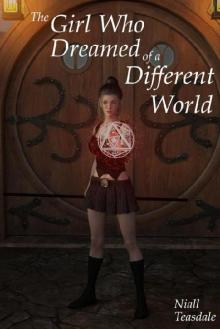 The Girl Who Dreamed of a Different World
The Girl Who Dreamed of a Different World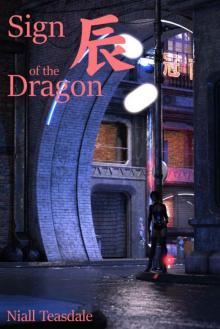 Sign of the Dragon (Tatsu Yamada Book 1)
Sign of the Dragon (Tatsu Yamada Book 1)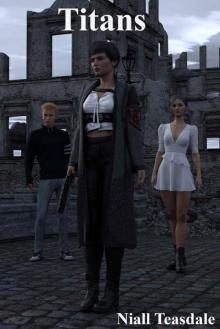 Titans
Titans True Dark
True Dark Liberty
Liberty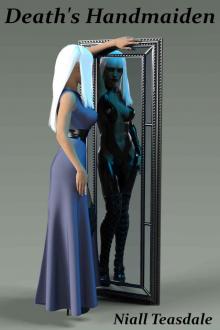 Death's Handmaiden
Death's Handmaiden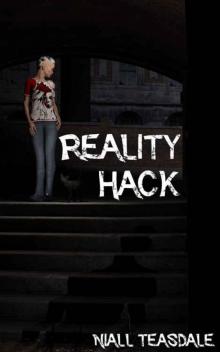 Reality Hack
Reality Hack Freedom, Humanity, and Other Delusions (Death's Handmaiden Book 3)
Freedom, Humanity, and Other Delusions (Death's Handmaiden Book 3)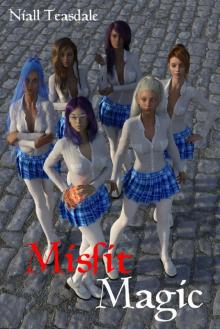 Misfit Magic (Misfits Book 1)
Misfit Magic (Misfits Book 1)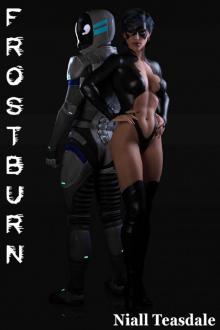 Frostburn (Ultrahumans Book 4)
Frostburn (Ultrahumans Book 4) Dominance (Fox Meridian Book 8)
Dominance (Fox Meridian Book 8)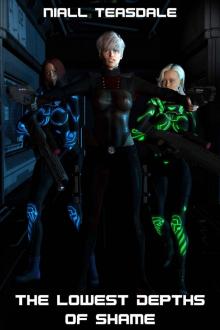 Aneka Jansen 6: The Lowest Depths of Shame
Aneka Jansen 6: The Lowest Depths of Shame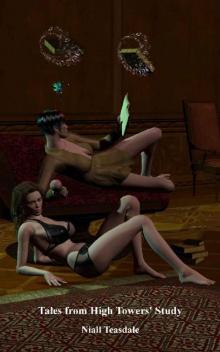 Tales from High Towers' Study
Tales from High Towers' Study The Eyes of the Huntress
The Eyes of the Huntress The Winter War
The Winter War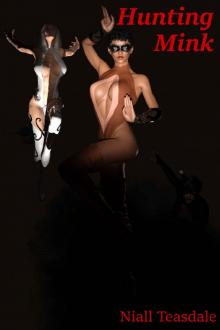 Hunting Mink
Hunting Mink Eden Burning
Eden Burning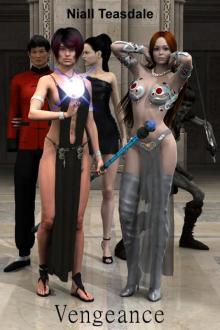 Thaumatology 12: Vengeance
Thaumatology 12: Vengeance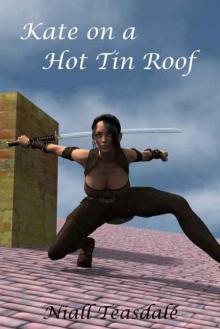 Unobtainium 1: Kate on a Hot Tin Roof
Unobtainium 1: Kate on a Hot Tin Roof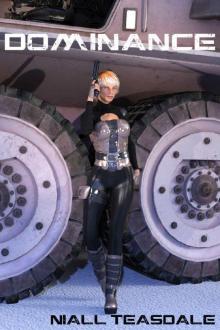 Dominance
Dominance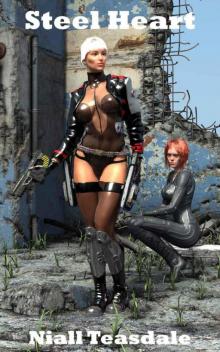 Aneka Jansen 3: Steel Heart
Aneka Jansen 3: Steel Heart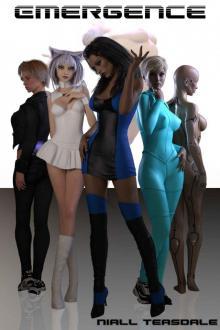 Emergence (Fox Meridian Book 5)
Emergence (Fox Meridian Book 5) Aneka Jansen 5: The Greatest Heights of Honour
Aneka Jansen 5: The Greatest Heights of Honour The Iron Princess
The Iron Princess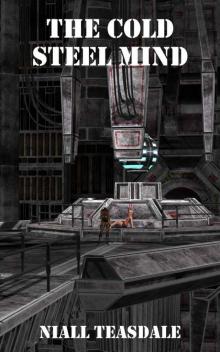 The Cold Steel Mind
The Cold Steel Mind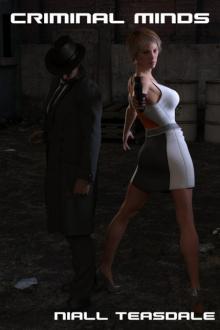 Criminal Minds (Fox Meridian Book 4)
Criminal Minds (Fox Meridian Book 4) Misfit Witchcraft (Misfits Book 2)
Misfit Witchcraft (Misfits Book 2) Eden Burning (Fox Meridian Book 7)
Eden Burning (Fox Meridian Book 7)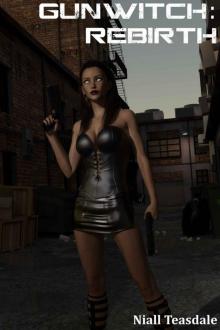 Gunwitch: Rebirth
Gunwitch: Rebirth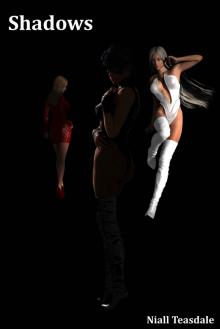 Shadows (Ultrahumans Book 2)
Shadows (Ultrahumans Book 2)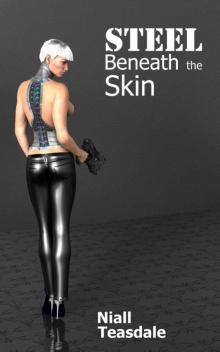 Steel Beneath the Skin
Steel Beneath the Skin The Iron Princess (The Twilight Empress Book 1)
The Iron Princess (The Twilight Empress Book 1)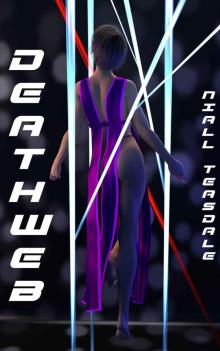 DeathWeb (Fox Meridian Book 3)
DeathWeb (Fox Meridian Book 3)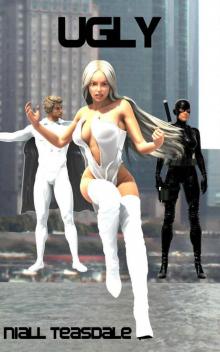 Ultrahuman 01 - Ugly
Ultrahuman 01 - Ugly Hunter's Kiss
Hunter's Kiss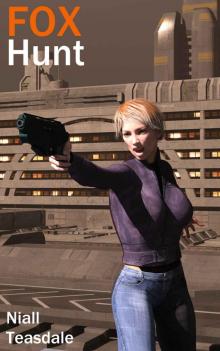 Fox Hunt (Fox Meridian Book 1)
Fox Hunt (Fox Meridian Book 1)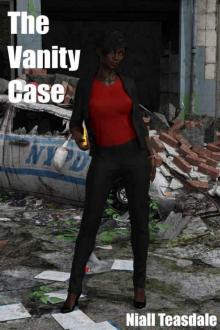 The Vanity Case (Sondra Blake Book 1)
The Vanity Case (Sondra Blake Book 1)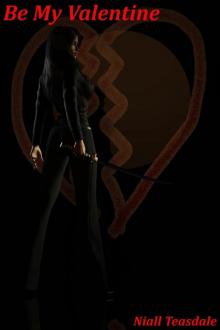 Be My Valentine
Be My Valentine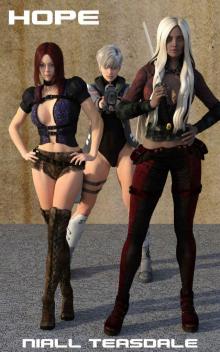 Aneka Jansen 7: Hope
Aneka Jansen 7: Hope The Eyes of the Huntress (Shil the Huntress Book 1)
The Eyes of the Huntress (Shil the Huntress Book 1) Children of Zanar 1: The Zanari Inheritance
Children of Zanar 1: The Zanari Inheritance